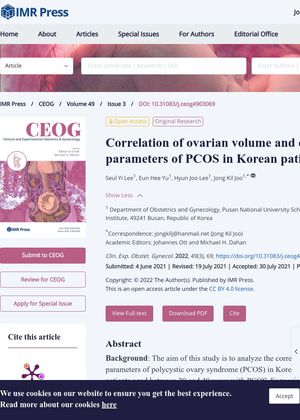Correlation of Ovarian Volume and Clinical and Laboratory Parameters of PCOS in Korean Patients
March 2022
in “
Clinical and Experimental Obstetrics & Gynecology
”

TLDR Ovarian volume is significantly related to higher levels of certain hormones in Korean women with PCOS.
The study analyzed the correlation of ovarian volume and clinical and laboratory parameters of polycystic ovary syndrome (PCOS) in 233 Korean women aged between 20 and 40 years. The results showed that free testosterone, total testosterone, and 17-alpha-hydroxyprogesterone (17-OHP) were statistically correlated with the total ovarian volume in PCOS patients. Additionally, serum anti-mullerian hormone (AMH) level was positively correlated with luteinizing hormone (LH) but negatively with body weight and body mass index (BMI). Therefore, the ovarian volume, quantified by ultrasonographic measurements, was significantly related to the increasing serum levels of free testosterone, total testosterone, and 17-OHP in Korean PCOS patients.





